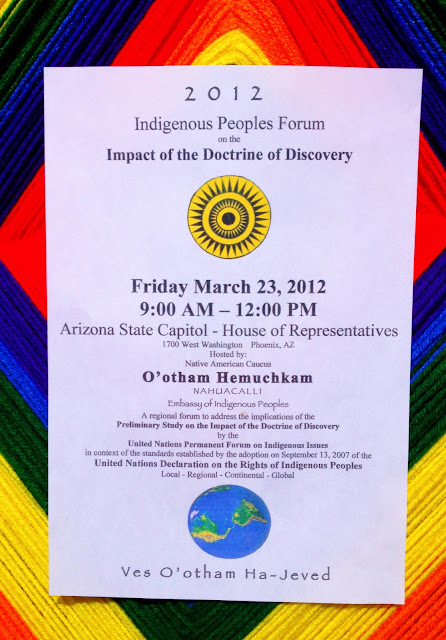Professor Robert J Miller,
Lewis & Clark Law School
Johnson v. M’Intosh, 21 U.S. (8 Wheat.) 543 (1823).
Here are the 10 elements that
I think constitute the Doctrine and are useful in analyzing and comparing how
settler/colonizer societies have used this international law against Indigenous
peoples around the globe. Robert
J. Miller, Native America, Discovered and Conquered: Thomas Jefferson, Lewis
& Clark, and Manifest Destiny 3-5
(Praeger Publishers, 2006; paperback edition University of Nebraska Press, 2008).
1. First discovery.
The first European country to discover lands unknown to other Europeans claimed property and sovereign rights over the lands and native peoples. First discovery, however, was usually considered to have created only an incomplete title.
2. Actual occupancy and current possession.
To turn first discovery into recognized title, a European country had to actually occupy and possess newly found lands. This was usually done by building forts or settlements. Physical possession had to be accomplished within a reasonable amount of time after the first discovery to create a complete title.
3. Preemption/European title.
Discovering European countries also claimed the power of preemption, that is, the sole right to buy the land from Indigenous peoples. This is a valuable property right similar to an exclusive option to purchase land. The government that owned the preemption right prevented or preempted any other European government or individual from buying land from the native owners. The United States still claims this power over Indian lands today. 25 U.S.C. section 177 (2006).
4. Indian or Native title.
After first discovery, Euro-American legal systems claimed that Indigenous Peoples and nations had lost their full property rights and full ownership of their lands. Europeans claimed that Indigenous nations only retained the rights to occupy and use their lands. Nevertheless, these rights could last forever if they never consented to sell to the European country that claimed the preemption power. If Indigenous nations did choose to sell, they were only supposed to deal with the government that held the preemption right. Thus, “Indian title” in the United States, and ‘Maori title’ in New Zealand, and Indigenous titles elsewhere allegedly defined limited ownership rights.
5. Tribal limited sovereign and commercial rights.
After a first discovery, Europeans considered that Indigenous Nations and Peoples had lost some aspects of their inherent sovereign powers and their rights to international free trade and diplomatic relations. Thereafter, they were only supposed to deal with the European government that had first discovered them.
6. Contiguity.
Under Discovery, Europeans claimed a significant amount of land contiguous to and surrounding their actual discoveries and settlements in the New World. Contiguity became very important when different European countries had settlements somewhat close together. In that situation, each country claimed to hold rights over the unoccupied lands between their settlements to a point half way between the actual settlements. Moreover, contiguity held that the discovery of the mouth of a river gave the discovering country a claim over all the lands drained by that river; even if that was thousands of miles of territory. For example, refer to the boundaries of the Louisiana Territory and Oregon country as defined by the United States.
7. Terra nullius.
This phrase literally means a land or earth that is null or void or empty. This element stated that if lands were not possessed or occupied by any person or nation, or even if they were occupied but were not being used in a fashion that European legal and property systems approved, then the lands were considered to be “empty” and available for Discovery claims. Europeans were very liberal in applying this element and often considered lands that were actually owned, occupied, and being used by Indigenous Peoples to be “vacant” and available for Discovery claims if they were not being “used” according to Euro-American laws and cultural mores.
8. Christianity.
Religion was a significant aspect of the Doctrine of Discovery. Under Discovery, non-Christian peoples were not deemed to have the same rights to land, sovereignty, and self-determination as Christians.
9. Civilization.
The European ideals of civilization were important parts of Discovery and of ideas of superiority. Europeans thought that God had directed them to bring civilized ways and education and religion to Indigenous Peoples and to exercise paternalism and guardianship powers over them.
10. Conquest.
This element claimed that Europeans could acquire Indian title by military victories in “just” and “necessary” wars. In addition, conquest was also used as a term of art to describe the property rights Europeans claimed to have gained automatically over Indigenous Nations just by showing up and making a “first discovery.”
1. First discovery.
The first European country to discover lands unknown to other Europeans claimed property and sovereign rights over the lands and native peoples. First discovery, however, was usually considered to have created only an incomplete title.
2. Actual occupancy and current possession.
To turn first discovery into recognized title, a European country had to actually occupy and possess newly found lands. This was usually done by building forts or settlements. Physical possession had to be accomplished within a reasonable amount of time after the first discovery to create a complete title.
3. Preemption/European title.
Discovering European countries also claimed the power of preemption, that is, the sole right to buy the land from Indigenous peoples. This is a valuable property right similar to an exclusive option to purchase land. The government that owned the preemption right prevented or preempted any other European government or individual from buying land from the native owners. The United States still claims this power over Indian lands today. 25 U.S.C. section 177 (2006).
4. Indian or Native title.
After first discovery, Euro-American legal systems claimed that Indigenous Peoples and nations had lost their full property rights and full ownership of their lands. Europeans claimed that Indigenous nations only retained the rights to occupy and use their lands. Nevertheless, these rights could last forever if they never consented to sell to the European country that claimed the preemption power. If Indigenous nations did choose to sell, they were only supposed to deal with the government that held the preemption right. Thus, “Indian title” in the United States, and ‘Maori title’ in New Zealand, and Indigenous titles elsewhere allegedly defined limited ownership rights.
5. Tribal limited sovereign and commercial rights.
After a first discovery, Europeans considered that Indigenous Nations and Peoples had lost some aspects of their inherent sovereign powers and their rights to international free trade and diplomatic relations. Thereafter, they were only supposed to deal with the European government that had first discovered them.
6. Contiguity.
Under Discovery, Europeans claimed a significant amount of land contiguous to and surrounding their actual discoveries and settlements in the New World. Contiguity became very important when different European countries had settlements somewhat close together. In that situation, each country claimed to hold rights over the unoccupied lands between their settlements to a point half way between the actual settlements. Moreover, contiguity held that the discovery of the mouth of a river gave the discovering country a claim over all the lands drained by that river; even if that was thousands of miles of territory. For example, refer to the boundaries of the Louisiana Territory and Oregon country as defined by the United States.
7. Terra nullius.
This phrase literally means a land or earth that is null or void or empty. This element stated that if lands were not possessed or occupied by any person or nation, or even if they were occupied but were not being used in a fashion that European legal and property systems approved, then the lands were considered to be “empty” and available for Discovery claims. Europeans were very liberal in applying this element and often considered lands that were actually owned, occupied, and being used by Indigenous Peoples to be “vacant” and available for Discovery claims if they were not being “used” according to Euro-American laws and cultural mores.
8. Christianity.
Religion was a significant aspect of the Doctrine of Discovery. Under Discovery, non-Christian peoples were not deemed to have the same rights to land, sovereignty, and self-determination as Christians.
9. Civilization.
The European ideals of civilization were important parts of Discovery and of ideas of superiority. Europeans thought that God had directed them to bring civilized ways and education and religion to Indigenous Peoples and to exercise paternalism and guardianship powers over them.
10. Conquest.
This element claimed that Europeans could acquire Indian title by military victories in “just” and “necessary” wars. In addition, conquest was also used as a term of art to describe the property rights Europeans claimed to have gained automatically over Indigenous Nations just by showing up and making a “first discovery.”
For a comparative law
analysis of the use of the Doctrine of Discovery in different European and
settler societies, see generally Robert
J. Miller, The International Law of Colonialism: A Comparative Analysis,
15 Lewis & Clark L. Rev. 847 (2012); Robert J. Miller & Micheline
D’Angelis, Brazil, Indigenous Peoples, and the International Law of
Discovery, 37 Brooklyn J. Int’l Law 1 (2011); Robert J. Miller, Lisa Lesage
& Sebastian Lopez Escarcena, The International Law of Discovery, Indigenous
Peoples, and Chile, 89 Nebraska L. Rev. 819 (2011); Robert J. Miller,
Jacinta Ruru, Larissa Behrendt & Tracey Lindberg, Discovering Indigenous
Lands: The Doctrine of Discovery in the English Colonies (Oxford Univ.
Press, 2010, paperback 2012); Robert J. Miller & Jacinta Ruru, An
Indigenous Lens into Comparative Law: The Doctrine of Discovery in the United
States and New Zealand, 111 West Vir. L. Rev. 849 (2009).















